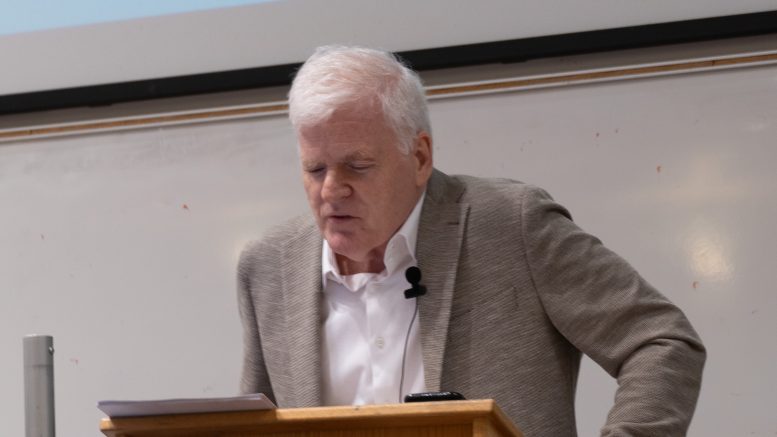The U of M welcomed Garry Sherbert on campus to present a lecture on Oct. 8 as part of a conference sponsored by Mosaic, an interdisciplinary journal on literature and theory founded at U of M.
In his lecture, Sherbert presented his research on the connections between works by 17th century English writer John Donne and 20th century French Algerian philosopher Jacques Derrida, particularly on the shared theme of self-sacrifice as a moral decision.
Sherbert is an English professor at the University of Regina who focuses on literary theory. Although Sherbert’s research interest may seem esoteric and abstract to many, he pointed out that it may be more versatile than one might think.
“Theory gives you the flexibility to go from one thing to another […] I highly recommend students to do as much theory as possible because it’s not only transferable between periods, it’s transferable to other subject areas,” he said.
“[It] provides a way to create and generate ideas […] Theory has been so valuable to me, and I’ve had my students report that the [undergraduate] theory course that they took was transferable even up to the graduate level.”
For example, Sherbert used Derrida’s theory of autoimmunity, referring to an entity’s ability to turn against itself like an autoimmune disease, in his lecture to link the different writers’ works together.
Sherbert also teaches courses on historical literature at the U of R. When asked about the importance of past literary works, he commented that they continue to inform the works produced today. For example, Sherbert highlighted the medieval character of Game of Thrones with its use of dragons, which effectively transports viewers into another world.
Sherbert also mentioned that over the centuries, older narratives will often resurface in later works.
“The older the text, the more archetypal it is […] I can go back to the ancient Greeks and the ancient Romans, and [their texts will] still entertain me and surprise me, as Shakespeare does […] That’s what the Renaissance means. It’s a rebirth of [the] classical,” said Sherbert.
With this perspective in mind, works such as Homer’s The Odyssey and L. Frank Baum’s The Wonderful Wizard of Oz may not be so distant after all — they both tell the story of a protagonist’s heroic voyage home from a faraway place and the strange characters they encounter along the way.
Lastly, as a professor, Sherbert concluded with a piece of advice he would like to give U of M students — talk to your classmates.
“You should use your university years as a time to meet other people and to use the educational experience to grow your brain and develop parts of yourself […] So maximize your social engagement with your peers, especially if you’re sharing a class with them. Don’t waste it,” he said ardently.
“Everybody has a different path, but enjoy this path that you each have with each other. Especially when I see my students in my classroom, I say, ‘Please talk to each other,’ because they can teach you as much as I can.”



